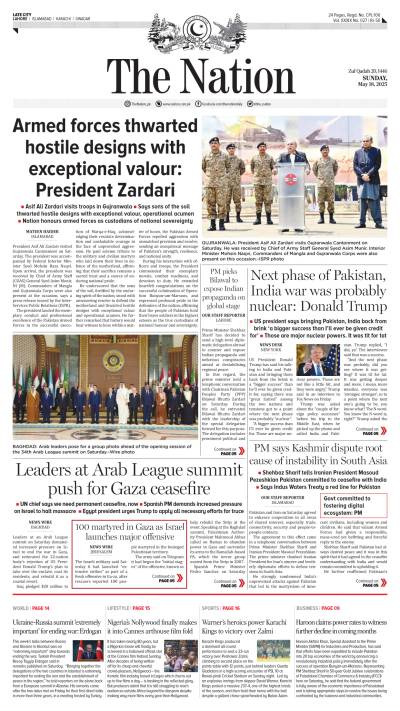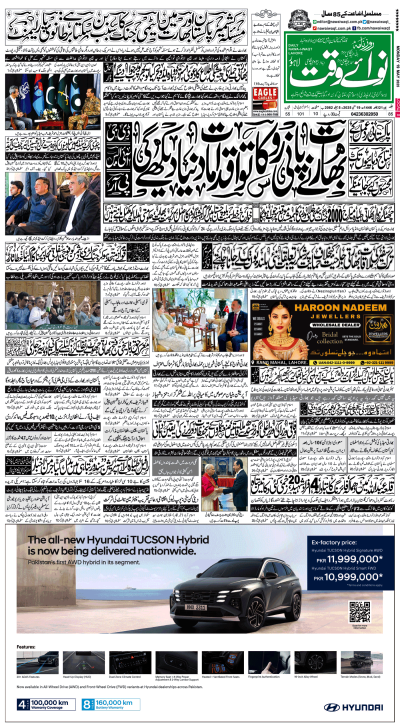IFTIKHAR ALAM
LAHORE
The fourth edition of two-day Lahore Literary Festival began yesterday at Avari Hotel with intellectuals, writers, poets, journalists and professionals from different walks of life coming to meet and inter-act with renowned literary people from around the world.
Tight security measures have been made for the festival, which earlier was scheduled to be held for three days at Alhamra. However, the Punjab government had cancelled the event at 11th hour due to what the government claimed was security threat. Later, the LLF management decided to hold the event for two days and shifted the venue. The “security issue”, however, could not deter the people from attending the festival.
This year the number of panelists from abroad was more than the three earlier editions of the event. The sessions were held in the two halls of the hotel, marquee and the Tollinton. Stalls of books, food and other souvenirs had been set up.
The LLF started with the conversation of Sharmila Tagore, the film actress known for her works predominantly in Hindi cinema, the widow of great India cricketer Nawab Mansor Ali Khan Pataudi, the mother of known bollywood actor Saif Ali Khan. Intellectuals, authors and writers remembered Intizar Hussain in second session of the festival. The LLF had already given Intizar Hussain the lifetime achievement award.
“His knowledge about daily routine life matters was almost zero. He was unaware how to make an identity card or from where to collect a passport. He was a silent soul, and shy in his conversation with females. But he was greatest Urdu fiction and non-fiction writer of 20th century,” said the speakers and demanded of the government to build a memorial in the name of Intizar Hussain in Lahore where his all literary work could be saved.
The debate on the literary figure Intizar Hussain who died on Feb 2 started with the presentation of some lines from his novel “Basti” by short story writer Dr Asif Farooqi. Poetess, columnist and story writer Kishwar Naheed, critic and teacher Nasir Abbas Nayyar talked about the intellectual work of Syed Intizar. Masood Asher, the host, Eruj Mubarik, Ikramullah Khan shared their thoughts on late Intizar’s personality. The trio had enjoyed long years of association with the literary giant.
“I met Intizar sahib first time in 1986. He migrated to Pakistan to see accomplishment of the dream which the founder of Pakistan had seen for this country. But during his 68 years stay in Pakistan he used to remember his native birthplace in India. Intizar sahib had great association with the country from whom he migrated,” said Ikramullah Khan.
“Intizar sahib was a true patriotic. He had great love for his country. He was opponent of socialists and progressive writers though he used to attend their sittings on invitation. Later, he stopped criticizing the socialists. I witnessed a change with the passage of time in his thoughts on life, international issues, Pak-India relations and other matters,” Khan added.
Eruj told the gathering that Intizar sahib’s complete name was Syed Muhammad Intizar Hussain. “He was younger to his four sisters and was by birth left hander. He was kind and generous.”
Masood remembered: “We would often meet at Pak Tea House, the meeting point for intellectuals, authors and free-thinkers. On Thursday evenings, we would gather at Kishwar Naheed’s place in Krishan Nagar. For some years we had made Nairang Art Gallery our meeting point. Every Sunday, we would get together with Intizar, Eruj Mubarak, Shahid Hameed, Ikramullah, and Zahid Dar. Also, we would spend Thursday evenings at Eruj Mubarak’s residence.”
Kishwar Naheed pointed out untalkative female characters in Intizar’s books. “Perhaps he himself was a silent soul that why females in his writings were not most communicative. I can remember his only book where a female character was talkative,” said Kishwar.
Nasir Abbas said the world of Intizar was imaginative and intellectual and he (Intizar) gave answers of all big questions of this time. The world of orientalism for Intizar was not only specific for India, Pakistan or Islam but it also dealt with the Persian, Arabic, Hindi, Israeli and Buddha civilizations.
“If Dr Iqbal was the greatest poet of 20th century then Intizar sahib was greatest fiction and non-fiction writer,” said Nayyar.
Monday, May 19, 2025
LLF lives up to expectations of intelligentsia

-
Lahore emerges among safest global cities in Numbeo 2025 index
-
Lahore emerges among safest global cities in Numbeo 2025 index
-
India’s suspension of Indus Water Treaty legally baseless
-
Seventh polio case reported in Pakistan amid nationwide vaccination drive
-
Pakistan reports sixth polio case of 2025
-
PTA begins issuing VPN licences to regulate usage
Culture Shift
May 18, 2025
Tactical Shift
May 18, 2025
Unmasked Cruelty
May 18, 2025
India Isolated
May 17, 2025
Descent into Hell
May 17, 2025
Pakistan’s Strategic Edge
May 19, 2025
Lessons for India
May 19, 2025
Galiyat’s Poor Network Services
May 19, 2025
A City in Neglect
May 19, 2025
Rising Cost of Living
May 19, 2025
ePaper - Nawaiwaqt
Nawaiwaqt Group | Copyright © 2025





